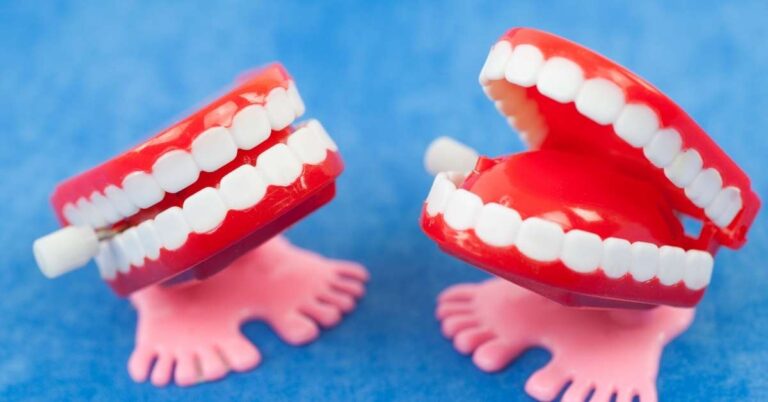Mewing While Sleeping: Is It Possible?
If you’re mewing, it’s likely because you want to improve your facial structure, to help you look and feel better. You might already know how many hours a day you should mew, but what about at night? We do spend about a third of our lives sleeping, after all.
For the question of mewing while sleeping, the position of your lips is far more important than the position of your tongue. It’s absolutely essential to keep your lips sealed and breathe through your nose while you sleep. There are a few key strategies you can do to help keep your mouth closed at night until it becomes more natural.
Tip: To get the most results out of mewing, focus on what you can control. During the day, that’s the position of your tongue and how much you use your jaw muscles. During the night, it’s the position of your lips.
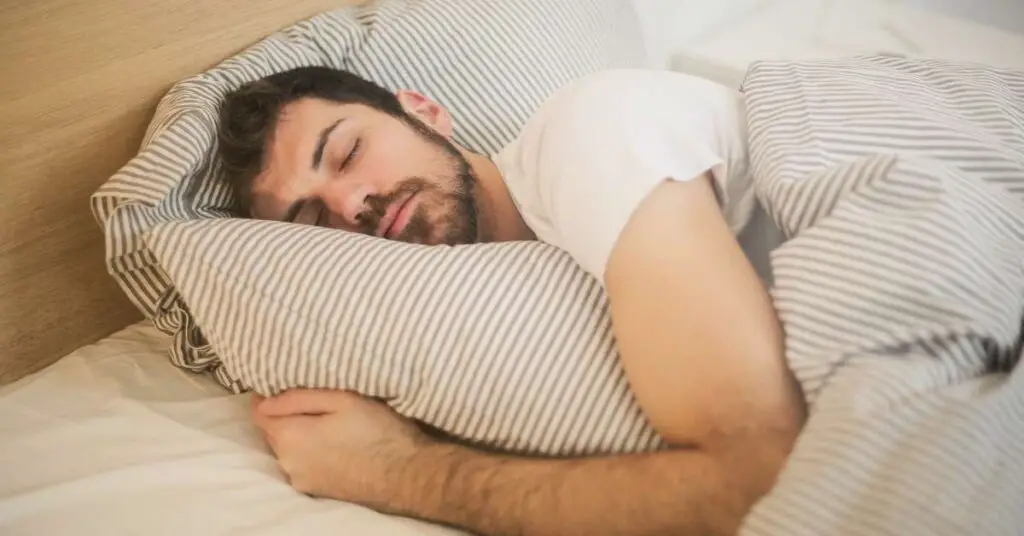
Lip posture is more important than tongue posture while sleeping
Yes, mewing tends to focus on the tongue and where to place it. But remember that mewing is just one piece of Dr. John Mew’s Orthotropic Premise, which posits that good oral posture means having your lips together, your teeth together, and your tongue on the roof of your mouth. These three elements combined are what influence the balance of facial structure.
Ideally, you’ll be mewing all day long, setting up reminders to catch yourself when you fall back into old habits. That means you’ll be actively using the muscles of your tongue to hold it up in place, at the roof of your mouth.
But of course, when we sleep, all of our muscles relax (that’s kind of the point of sleeping). So despite what some less reputable mewing websites may tell you, you can’t really actively press your tongue while you’re asleep. You can’t actively do anything.
What you can do is focus on that other crucial element of the orthotropic premise: the position of the lips.
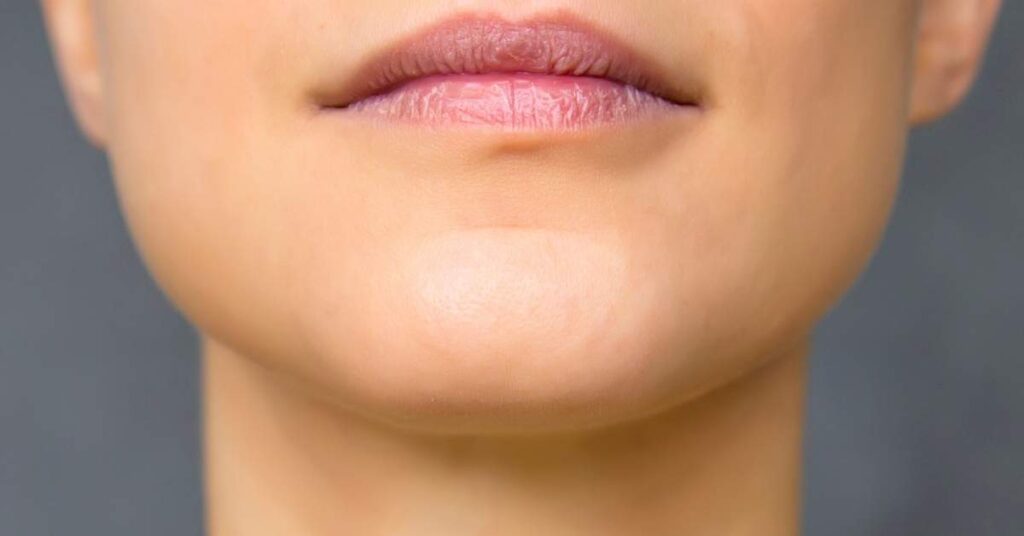
Are you one of those lucky people who naturally keeps your lips closed all night, easily breathing through your nose? Then good for you—-you’re all set. Keep doing what you’re doing, and focus on your tongue posture during the day.
But chances are, if you’re reading about mewing, it’s because good oral posture doesn’t come naturally to you. Don’t worry—-you’re not alone. Our modern diet means that many of us have issues with facial structure and breathing properly (source).
Thankfully if you don’t naturally keep your lips sealed at night, that’s something you can—-and should—-change. Doing so can help you look better in the long run (see how long it takes to see mewing results here). Even more important, nose breathing is important for treating things like sleep apnea and snoring, as well as for filtering the air you breathe. In short, breathing through your nose is an essential part of a healthy lifestyle.
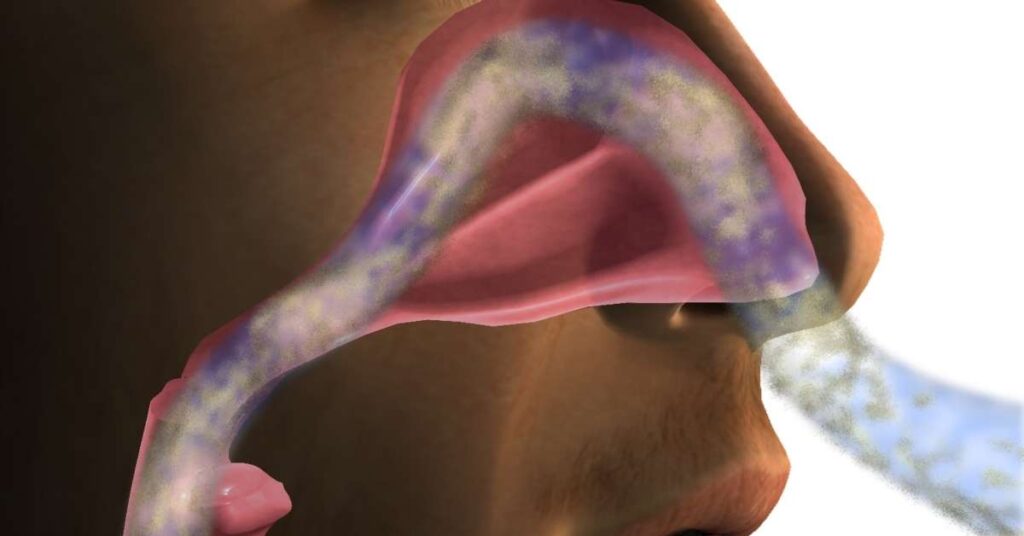
In fact, according to Dr. Mike Mew (the dentist at the forefront of orthotropics, and from whom ‘mewing’ gets its name), “it’s almost as if the act of achieving a natural lip seal brings everything together and makes the face bloom.”
Dr. Mew refers to the lips as the ‘magnets’ of the mouth—-where they go, the rest of the mouth follows. When your lips Sealed nice and tight, then your teeth and tongue are going to start to go where they’re supposed to. But when your mouth is agape and your lips are wide apart, your tongue will fall closer to the airways, which may exacerbate snoring and sleep apnea.
Lip seal and sleep apnea
If you struggle with tongue posture and mouth breathing, then there’s a good chance you have sleep apnea as well. This is one example of why mewing is about so much more than just making your chin look better. That’s because sleep apnea is a serious health problem, linked to bigger issues like heart failure, diabetes, obesity, hypertension, and stroke (source).
If you suspect you have sleep apnea, then you should definitely talk to your doctor. And everyone should work towards breathing through their nose at night.
And note that a meta-analysis study found that myofunctional therapy (which is essentially mewing under an orthodontist’s instruction) helps with sleep apnea in 50% of adults and 62% of children.
Mewing While Sleeping: How to Keep Your Lips Sealed
Like we’ve covered, if you narrowly define mewing as simply pressing your tongue on the roof of your mouth, then you can’t really mew at night. That said, if you have a good mewing practice, then hopefully your resting tongue posture will start to improve, even while you’re sleeping.
But, if you understand mewing to be all the strategies that Dr. Mew recommends to improve facial structure, then you can mew at night: by keeping your lips sealed.
So how to keep your lips sealed? Simple. By taping them shut.
Yes—-you read that right. If your lips naturally fall open while you sleep, then a good way to keep them closed is to tape them closed.
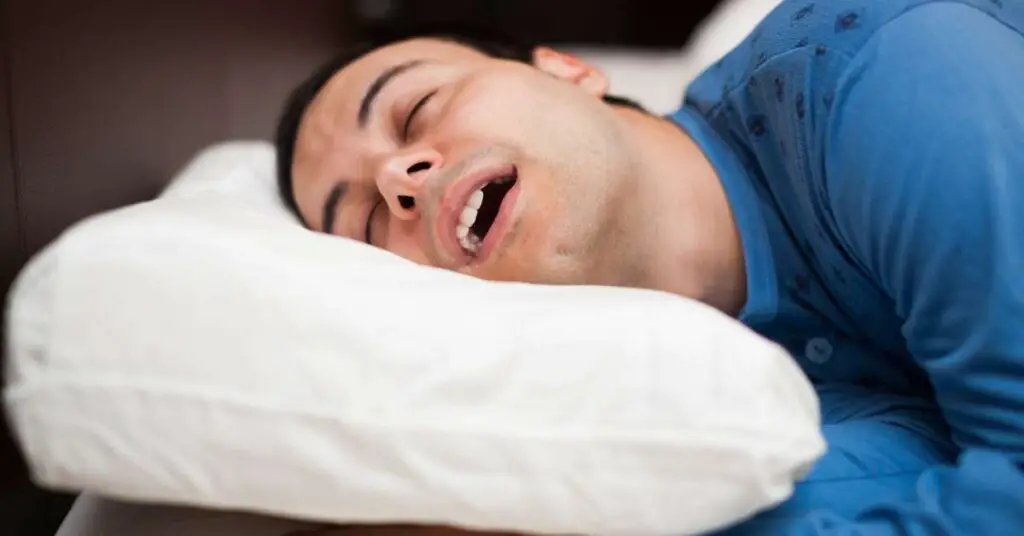
First, you might want to figure out if you mouth-breathe at night. If you snore, then there’s a good chance your mouth is open. If you wake up with a sore throat and/or dry mouth, then there’s also a good chance your mouth is open. If you have a partner, you could ask them to check you throughout the night. And finally, if you find you often have your mouth open during the day (tsk, tsk), then you’ve probably got it open at night, too.
Once you’ve decided you’re a night-time mouth-breather, then your next step is quite straightforward. Simply get some gentle medical tape, and tape your lips shut at night. I generally opt for gentle, paper medical tape, which you can easily find in the drug store or online. You might need to try out a few varieties before finding a type that you like.
Tip: This is the medical tape I use every night (Amazon). It’s strong enough to stick, but gentle enough not to tear my skin off when I remove it in the morning.
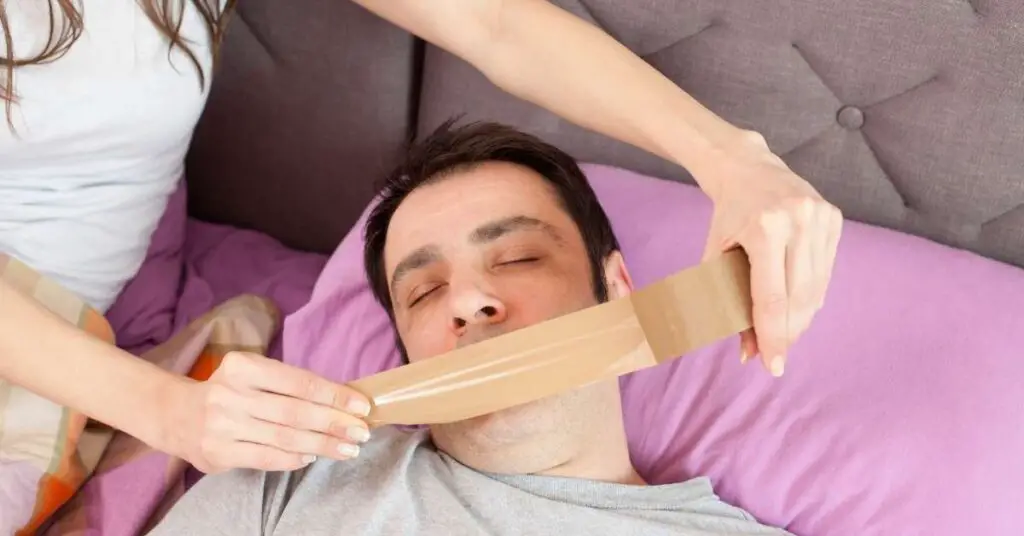
When you’ve got your tape, you can keep it on your bedside table, and put some on at bedtime. Like Mew demonstrates in this video, you can place it however you like – horizontal or vertically, with your lips resting naturally or pressed together.
Note that I’ve seen different doctors and health practitioners recommend mouth taping, and they don’t mention any risk associated with it. Many even say children can do this. The idea is that if your nose were to become obstructed for any reason, you’d wake up. I’d still advise people not to combine this with drinking or doing drugs.
But also note that the idea isn’t to absolutely seal your lips shut so that no air could possibly get through. The idea is to place the tape so it gently tugs on the skin, helping and reminding your to keep your lips closed. You shouldn’t be blocking them completely.
If mouth taping at night isn’t your thing, you’ve got a few options. First, you could give it a try during the day, and get used to the feeling (and yes—-it is a bit weird at first).
Alternatively, you can get something called a snoring chin strap. Just like the name suggests, these are straps that you wear over your head at night. They essentially keep your jay from hanging open. That said, just because your jaw isn’t open, that doesn’t mean your lips are necessarily sealed.
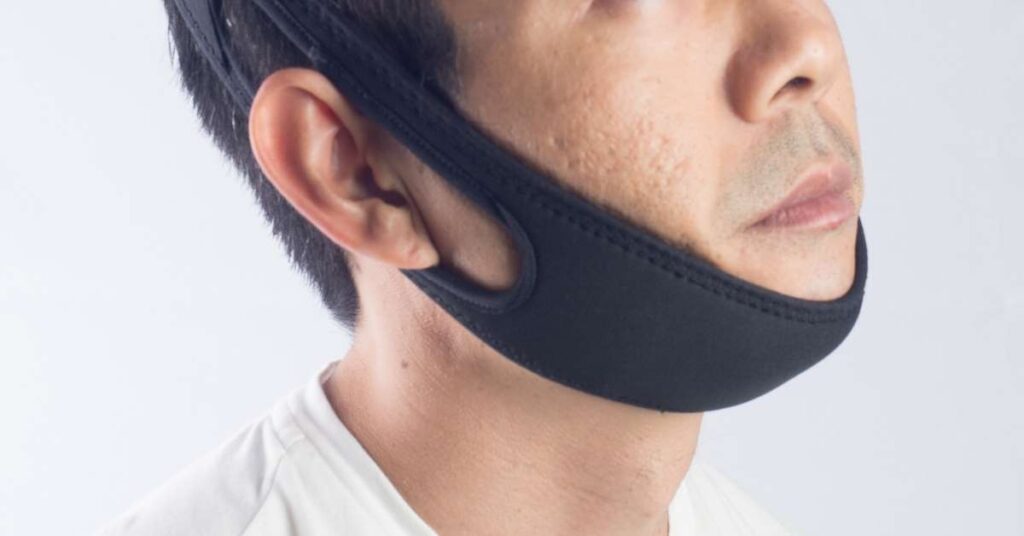
Finally, you can also use nasal strips. You may also need to to talk to a doctor about surgery or other options if your nose is severely blocked. I also like this trick to unblock your nose in under three minutes, if this is a chronic issue for you.
Mewing While Sleeping: The Right Posture
According to Dr. Mew, if you’re trying to keep your lips sealed and maintain good tongue posture at night, then you want to avoid sleeping on your back. When you’re on your back, it’s too easy for your mouth to hang agape and your tongue to roll back into the back of your throat (hello, snoring).
In fact, he even recommends sewing a half tennis ball on to the back of your pajamas, to keep you from rolling over onto your back. You could also ask a partner to nudge you if they notice you in the wrong position.
That said, the best thing you can do for your health is get a good night’s sleep. Sleep is when your body rests and recovers. It’s also when most bone growth occurs (source).
So if you find you really can’t sleep on your side, and you can only sleep on your back (and you’ve really tried), then I’d suggest you prioritize sleep over sleep posture. In other words: use your best judgement when it comes to sleep posture, and don’t torture yourself.
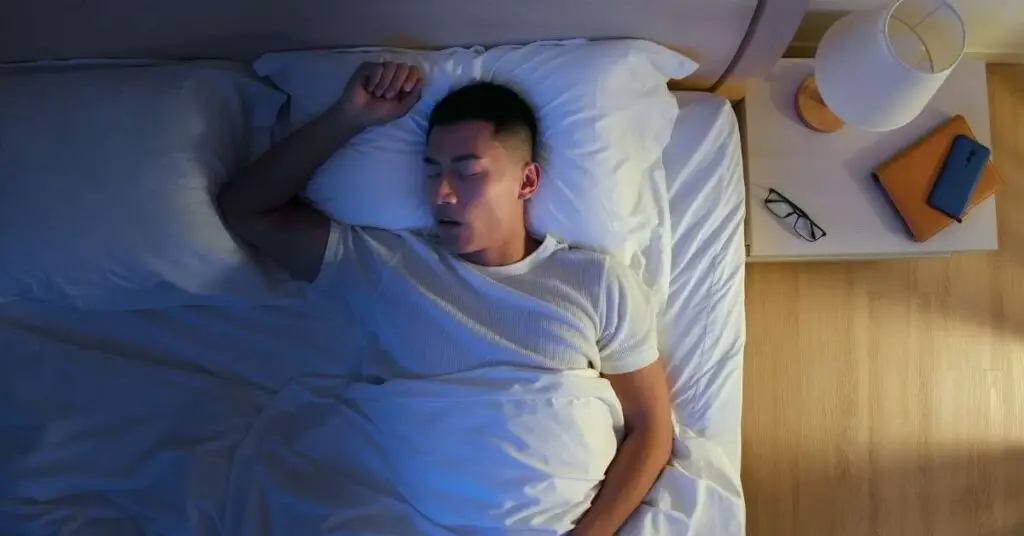
Mewing for Better Health
Yes, many people are attracted to mewing because of all the ways if you can make you more attractive. But ideally, your appearance is just what hooks you in. More and more, we’re learning that proper nasal breathing is a very key element of your overall health. And we’ve always known that posture matters.
So ‘how to mew while you sleep’ might be the wrong question. The better question is ‘how can I sleep better, breathe better, and maintain better oral health and facial appearance, all at once?’
The answer to that question is to mew during the day, and keep your lips sealed at night. And the more you consciously keep your tongue in the right position while you’re awake, the better resting position it will adopt when you’re asleep.
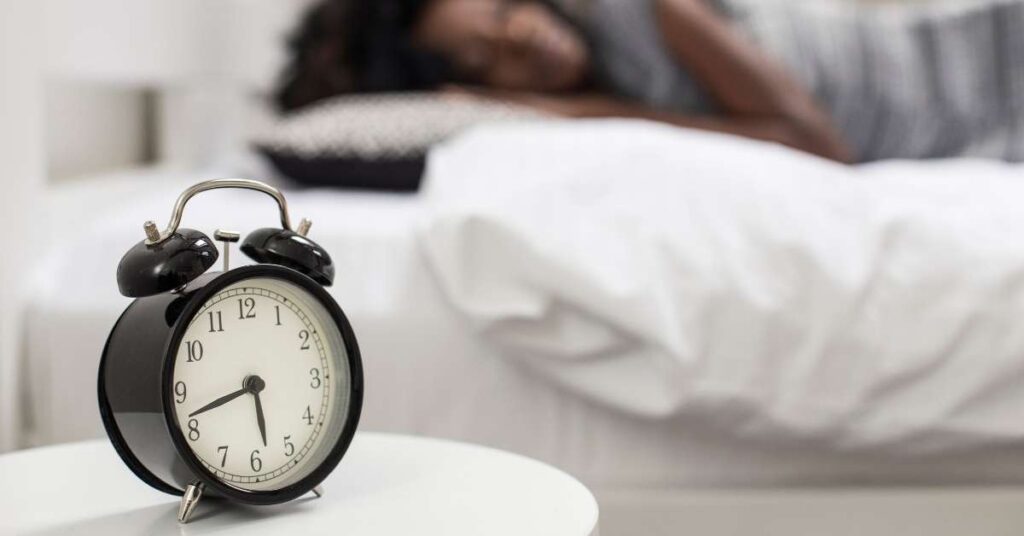
Related Posts:
- What Is Mewing?
- Where To Place The Tongue When Mewing
- Can Mewing Fix A Receding Chin?
- Mewing: How Long Until You See Results?
- How Many Hours A Day Should You Mew?
Related Questions:
Can You Mew While Sleeping?
You cannot actively mew while sleeping, but you can breathe through your nose with your lips sealed during sleep—an important part of the mewing process. If you are concerned about facial structure and appearance, it’s much more important to keep your lips sealed at night than to worry about tongue posture. And the more you mew during the day, the better your resting tongue posture will be at night.
How Long Are You Supposed To Mew For?
You should be mewing and maintaining good tongue posture as much as possible during the day. Experts recommend you mew for at least 4-8 hours a day, but the more the better.
What Should You Not Do While Mewing?
You can do just about everything while mewing—-in fact, Dr. Mew, the orthodontist at the forefront of mewing, even has exercises for chewing and swallowing. That said, you should never mew to the point of pain. ‘Hard mewing,’ where you’re more actively pressing your tongue into the roof of your mouth, can also be a problem for people with jaw issues.
Should You Sleep On Your Back While Mewing?
It’s better to sleep on your side while mewing. When you sleep on your back, your tongue may fall back into the back of your throat, causing you to snore and mouth-breathe. That said, it’s more important to keep your lips sealed at night, so sleep in a position that lets you do that comfortably.
Can Mewing Help Sleep Apnea?
Studies have shown that myofunctional therapy, which correlates with mewing, can help reduce sleep apnea symptoms in children and adults. Nose breathing and good oral posture may also help improve sleep conditions like snoring.

